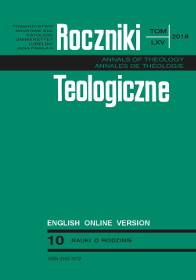Gambling Seniors and the Family Context
Abstrakt
The article presents some of the results of surveys on the gambling activity of seniors in Poland.[1] Research on 80 respondents aged 60+ was conducted using an in-depth qualitative interview method. The article presents the results of the family context of gambling seniors. The following aspects linking family factors to elderly people who gamble have been taken into account: family conditions that initiate gambling among seniors, family factors that motivate gambling, family attitudes towards gambling by seniors, and the consequences of gambling on family life. Gamblers often saw gambling practices in their own family homes, and so gambling practiced in old age may be a way of escaping from loneliness or be a source of hope for improving their financial situation and helping relatives. Gambling in extreme cases contributes to the breakup of the family, and often causes conflicts among family members. Relatives show different attitudes towards gambling, from tolerance and downplaying to severe opposition (depending on the severity of gambling by a senior).
[1] The study was conducted between 2016 and 2017 within the “Gambling in the lives of seniors” project implemented by KUL and co-financed by the Gambling Problem Solving Fund at the disposal of the Minister of Health.
Bibliografia
Abbott, Max W., Christine A. Stone, Rosa Billi, Kristal Yeung. “Gambling and problem gambling in Victoria, Australia: Changes over 5 years.” Journal of Gambling Studies” no 32 (2016): 47–78.
Alberghetti, Alessandra, Patricia A. Collins. “A passion for gambling: A generation-specific conceptual analysis and review of gambling among older adults in Canada.” Journal of Gambling Studies no 31(2) (2015): 343–358.
Ariyabuddhiphongs, Vanchai. “Older adults and gambling: A review.” International Journal of Mental Health and Addiction no 10(2) (2012): 297–308.
Badora, Barbara, Magdalena Gwiazda, Marcin Herrmann, Jolanta Kalka, Jacek Moskalewicz. Oszacowanie rozpowszechnienia wybranych uzależnień behawioralnych oraz analiza korelacji pomiędzy występowaniem uzależnień behawioralnych a używaniem substancji psychoaktywnych [Estimation of the prevalence of selected behavioral addictions and correlation analysis between the occurrence of behavioral addictions and the use of psychoactive substances]. Warszawa: Centrum Badania Opinii Społecznej, 2015.
Botterill, Emma, Peter Richard Gill, Suzanne McLaren, Rapson Gomez. “Marital status and problem gambling among Australian older adults: The mediating role of loneliness.” Journal of Gambling Studies no 10 (2015): 1–12.
Burge, Alesia N., Robert H. Pietrzak, Cheryl A. Molina, Nancy M. Petry. “Age of gambling initiation and severity of gambling and health problems among older adult problem gamblers.” Psychiatric Services no 55(12) (2005): 1437–9.
Ciura Grzegorz, Jolanta Szymańczak, Biuro Analiz Sejmowych Kancelarii Sejmu. Warszawa, 2012.
Lelonek-Kuleta, Bernadeta. “Patologiczny hazard wśród osób starszych” [Pathological gambling among seniors]. Świat Problemów no 9 (2015): 37–41.
Medeiros, Gustavo C., Eric Leppink, Ana Yaemi, Mirella Mariani, Hermano Tavares, Jon Grant. “Gambling disorder in older adults: A cross-cultural perspective.” Comprehensive Psychiatry no 58 (2015): 116–121.
Rahman, Ardeshir S., Corey E. Pilver, Rani A. Desai, Marvin A. Steinberg, Loreen Rugle, Suchitra Krishnan-Sarin, Marc N. Potenza. “The relationship between age of gambling onset and adolescent problematic gambling severity.” Journal of Psychiatric Research no 46(5) (2012): 675–683.
Racław, Mariola, Magdalena Rosochacka-Gmitrzak. Proces starzenia się w kontekście wyzwań demografii, polityki społecznej oraz doniesień badawczych [The aging process in the context of demographic challenges, social policy and scholarly findings], the “Aktywny senior—najlepszy rzecznik swoich społeczności” project co-financed from the funds of Ministry of Labour and Social Policy under the Government Programme for Social Participation of Senior Citizens for 2012–2013.
Strzelecki, Zbigniew, Janusz Witkowski. “Demograficzne uwarunkowania systemu ubezpieczeń społecznych w Polsce” [The demographic conditions of the social insurance system in Poland]. In Ubezpieczenia społeczne w Polsce. 10 lat reformowania [Social insurance in Poland. 10 years of reforms], edited by Józef Hrynkiewicz, 15–69. Warszawa: ISNS UW, 2011.
Subramaniam, Mythily. “Prevalence and determinants of gambling disorder among older adults: A systematic review.” Addictive Behaviors no 41 (2015): 199–209.
Subramaniam, Mythily, Edimansyah Abdin, Shazana Shahwan, Jay Vaingankar, Louisa Picco, Colette Browning, Shane Thomas, Siow Chong. “Culture and age influences upon gambling and problem gambling.” Addictive Behaviors Reports no 1 (2015): 57–63.
Szlązak, Małgorzata. “Starzenie się populacji wyzwaniem dla polityki społecznej” [Population aging as a social policy challenge]. Materiały konferencyjne [Conference Materials]. Kraków: Regionalny Ośrodek Polityki Społecznej w Krakowie 2012.
Tirachaimongkol, Luxana C., Alun C. Jackson, Jane E. Tomnay. “Pathways to problem gambling in seniors.” Journal of Gerontological Social Work no 53(6) (2010): 531–546.
Wądołowska, Katarzyna. Obraz typowego Polaka w starszym wieku [The image of a typical senior Pole]. Warszawa: Centrum Badania Opinii Społecznej, BS/2/2010.
Copyright (c) 2018 Roczniki Teologiczne

Utwór dostępny jest na licencji Creative Commons Uznanie autorstwa – Użycie niekomercyjne – Bez utworów zależnych 4.0 Międzynarodowe.





